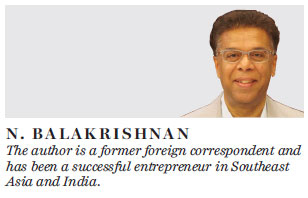Sensible ways to stop tax evasion
Updated: 2016-04-25 07:47
By N. Balakrishnan(HK Edition)
|
|||||||||
N. Balakrishnan argues that it is unlikely that tax loopholes will disappear and the best solution to preventing tax evasion is a simple tax system like Hong Kong's
In Southeast Asia there is a popular pastime call wayangkulit, performed with leather puppets behind screens on which shadows appear to be fighting furiously - but actually no fighting or even touching ever occurs. The puppet masters in this shadow play make a lot of noise and move the puppets vigorously to distract from the lack of any real fighting going on.
All the chest thumping in the Western media about the "Panama Papers" reminds me of this boisterous shadow play. If the US and European countries really want to stop the supposed tax evasion going on in Panama and other tropical islands, they can do so with a stroke of the pen.
The developed countries can refuse to recognize the companies from these countries unless they reveal the real identities of shareholders - they will comply soon enough. One cannot imagine these thinly populated tropical islands withstanding the threat of sanctions for more than a couple of weeks.

But the developed countries will not do anything substantive to stop the practice because the top dogs in these countries benefit from the current system of complex tax laws that snares the small guy but provides a lot of loopholes to the big players, such as "offshore" tax havens, to evade tax quite legally. But since the masses in developed countries demand some "action" the governments engage in this massive shadow play full of "sound and fury" but no effective action.
The dirty little secret of the industry is that these "offshore" companies are actually formed and often controlled from some law firms in London, Geneva and similar places. These are what are called "brass plate" companies - only the name with the brass plate is offshore in Panama or Bermuda, with the substantial control actually residing in some major financial center. In other words, offshore companies are a legal fiction, abetted by the laws of the major financial powers. The real culprit is not some pirate in the tropical island but one living right among the skyscrapers of London!
Offshore havens and tax planning are not new. Countries such as India which have lost a lot of tax revenue through this "black money" for decades have been petitioning the developed countries for some sort of cross-border tax information sharing for decades, but the developed countries which benefit from these "leaks" have not bothered until now. And that is because they benefit from this "incoming" capital from the poor countries.
Believe it or not, even during the 1980s when the world was staring at famine in Ethiopia and pop singers in Britain were holding charity concerts for the starving, sub-Saharan Africa was exporting capital to the Organization for Economic Cooperation and Development (OECD) countries. Only recently did the OECD countries finally agree to stop collecting debt with interest from the starving masses of Africa.
But now, as economies stagnate in the developed countries, particularly in Europe, and an aging population means that there seems to be no easy way to achieve economic growth, these countries are now becoming vocal about catching and punishing tax avoiders. Hypocrisy in international relations is the norm rather than the exception but all this feigned "shock" at revelations from the "Panama papers" stems either from ignorance or more likely a political shadow play to fool the masses.
Another irony is that the name of Hong Kong is being dragged through the mud in this incident, with "shocked" foreign media reporting Hong Kong is the hub for such tax evasion. But no such shock seems to be expressed about how so many of the "tax havens" have British connections ranging from the Cayman Islands, Bahamas, British Virgin Islands, Isle of Man and so on. So why not put pressure on Britain, which directly and indirectly controls most of these territories, instead of putting the blame on traditional "middleman" economies such as Hong Kong? Hong Kong did not create or control these offshore havens but merely channels businesses to them in an open and upfront way.
The irony is that if the developed countries had a simple tax system such as the one that Hong Kong has, namely a flat tax rate with few if any "exemptions" or "loopholes", the pressure for having an offshore company or bank account will diminish drastically, though it is unlikely that it will disappear completely.
So rather than blaming Hong Kong for tax evasion, perhaps the treasury teams from the "shocked" OECD countries can send teams to Hong Kong to learn about how to implement a simple tax system that will be the ultimate deterrent to elaborate tax evasion.
Let us stop the shadow boxing and blame game. Let us try and work out a fair tax system in which the rich countries don't just keep quiet or even welcome "flight capital" when it suits their needs and then cry "tax evasion" when flight capital goes the other way!
(HK Edition 04/25/2016 page11)